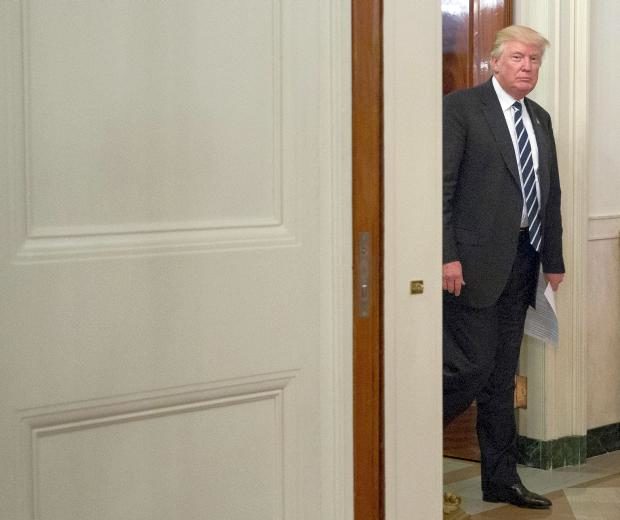Trump declares ‘total vindication’ in tweet on Comey

President Donald Trump walks into the State Dinning Room of the White House in Washington to meet with US Mayors and Governors for an Infrastructure Summit, Thursday, June 8, 2017. (Photo by PABLO MARTINEZ MONSIVAIS / AP)
WASHINGTON — Claiming “total and complete vindication,” President Donald Trump broke his Twitter silence Friday morning to weigh in on fired FBI Director James Comey’s closely watched testimony.
Trump, who had refrained from tweeting all day Thursday — even as Comey accused his administration of spreading “lies” and suggested Trump had attempted to influence the investigation into Russian interference in the 2016 election — struck back in an early-morning tweet.
“Despite so many false statements and lies, total and complete vindication,” Trump wrote, suggesting that Comey, who was under oath at the hearing, had committed perjury.
Trump also seized on Comey’s revelation that he had directed a friend to release memos he’d written documenting his conversations with the president to a reporter.
“…and WOW, Comey is a leaker!” Trump wrote at 6:10 a.m.
Article continues after this advertisementTrump also retweeted a comment from attorney Alan Dershowitz?, who had written: “We should stop talking about obstruction of justice. No plausible case. We must distinguish crimes from” political “sins.”
Article continues after this advertisementTrump was expected to face journalists at the White House later Friday in a joint news conference with Romanian President Klaus Iohannis. He also planned to deliver remarks at the Department of Transportation on his plans for improving the country’s roads and bridges before traveling to New Jersey for the weekend.
Trump had stayed unusually quiet on Thursday, refraining from weighing in on the testimony gripping the country both on Twitter and at several public appearances. Instead, Trump let his lawyer do the talking for him.
But the self-imposed silence didn’t last. The White House announced late Thursday that Trump would be holding a press conference with Iohannis. Comey’s testimony is certain to dominate the question-and-answer session.
In his first congressional appearance since being abruptly fired by Trump last month, Comey detailed months of distrust of the president and bluntly asserted that Trump had fired him to interfere with the probe of Russia’s ties to the Trump campaign.
He said that he’d carefully documented his interactions with Trump because he worried Trump would misrepresent them, and accused the administration of spreading “lies, plain and simple” about the reasons for his firing.
Comey’s testimony underscored the discord that had soured their relationship. He painted Trump as a chief executive dismissive of the FBI’s independence and made clear that he interpreted Trump’s request to end an investigation into the former national security adviser as an order coming from the president.
Comey also revealed that he’d orchestrated the public release of information about his private conversations with the president in an effort to further the investigation.
Trump’s private attorney, Marc Kasowitz, seized on the admission, casting the former FBI director as one of the “leakers” set on undermining the Trump administration.
The attorney is expected to file a complaint with the Justice Department inspector general about the revelation next week, according to a person close to the legal team who agreed to speak ahead of the filing on condition that the person’s name is not used.
Kasowitz also maintained that the testimony made clear that Trump “never, in form or substance, directed or suggested that Mr. Comey stop investigating anyone.”
While Trump’s staunchest supporters have tried to paint Comey’s testimony as vindication for the president, few Republicans who don’t work for Trump stepped in to defend the president’s version of his contacts with Comey.
Sen. Susan Collins, a moderate Republican, said Congress needs to obtain any tapes the president might have of his dealings with the former FBI director. She called Comey an “honorable individual.”
“I found him to be credible, candid and thorough,” Collins said of Comey on MSNBC’s “Morning Joe.”
Collins, a member of the Senate intelligence committee, which is investigating Russia’s interference in the 2016 election, said Comey’s motivation “may have been a good one.” But, she said, he was wrong to leak his notes to the public and should have given that document to her panel.